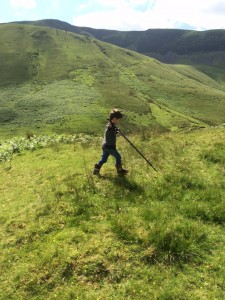[contextly_auto_sidebar id=”D79ZmQZ1r18MLDnvTSSvi9ZjhmQPHxki”]
Back from vacation. With some news about my composing.
But first, our annual trip — three weeks this time — to the Yorkshire Dales. In the north of England. More sheep than people. Bucolic and gorgeous, but also offers long walks, sometimes over wild terrain. No matter how wild, there always are sheep. Which shepherds have to round up, in all weather, all seasons, rain, snow, freezing cold. Not easy work! As we’ve come to appreciate.
 Can’t resist sharing this photo of Rafa — who’ll be four in October — striding through the hills. With a stick he purloined from me! Walking with a stick, on steep hills, is a convenience for me, not a necessity. So I didn’t mind that Rafa took it. I did suggest that maybe he shouldn’t use the stick to make holes in a place where flowers were growing. And he answered me wonderfully:
Can’t resist sharing this photo of Rafa — who’ll be four in October — striding through the hills. With a stick he purloined from me! Walking with a stick, on steep hills, is a convenience for me, not a necessity. So I didn’t mind that Rafa took it. I did suggest that maybe he shouldn’t use the stick to make holes in a place where flowers were growing. And he answered me wonderfully:
I just made a LITTLE hole.
I just made a hole so the mouse has a way down.
Send the kid to law school!
Now about composing. Next spring, on April 14, I’ll be presenting an evening of my music at Strathmore. More about that to come. But here’s a preview, two pieces that will be on the program, as performed at a surprise birthday party I staged for my wife. Both pieces were written for her. One is a song for voice and piano, to a Rilke text. The other is a string quartet, which I wrote in 2001 as a surprise birthday present. Brought musicians to our apartment to surprise her with it.
And last month I surprised her again with performances of both pieces. The string quartet has been done a number of times by the Fine Arts Quartet. But no one ever sang the song before.
Here are links, to the really fine performances Anne heard at her party. They can serve as an introduction to my music, for those who haven’t heard it.
“Ich bin, du Ängstlicher.”
Marlissa Hudson, soprano
George Peachey, piano
Quartet for Anne
Entcho Todorov, violin 1
Hiroko Naguchi, violin 2
Jonathan Dinklage, viola
Peter Sachon, cello
Loyal blog readers may recognize Marilssa’s name. She guest-blogged (here and here), about an entrepreneurial project. So lovely to work with her as a musician!

hello greg, it might interest you that l have been debating for some time now about the decline of classical music on the composers forum .I’ve used excepts from your blog to back up my arguments l have’nt changed any minds yet and I’m treated as something of a heretic(you know the feeling) but the debate is still raging.lm also trying to promote your ideas on my website onedarylsprakecomposer.com,
thanks for your efforts to create a new more inclusive classical music,best regards ,daryl sprake
Can anyone please tell me what percentage of the classical music audience listens to contemporary classical.
l need this information for the debate,thanks
Here is an except from my post on the debate the reason classical music is dying on the composers forum
YOU KEEP MISSING THE POINT ,you are obsessed with surface detail and miss the fundamentals,
the fundamentals are this,the music culture behind classical music is flawed because it does not produce sufficient music that people want to listen too,The flaws in this music culture are this,
1) a narrow insular snobbish mind set
2) a belief that in order to be a proper classical composer you must be educated in a institution
3) an education system that encourages conformity and discourage individuality for example the belief that technical innovation is and end in its self is a by product of a conformist mind set
4) to much attachment to the past the great tradition of classical music is dead intellectual baggage .l do not care how much you or anyone knows about the past ,the only way to create something new is to let go of the past.
5) an education system that emphasize intellect over emotion,this allows emotionally restricted intellectuals to gain power in the system and block a more balanced inclusive approach ( please do not misunderstand me l have nothing against emotionally restricted intellectuals l just think they have nothing to say musically).the most important thing a composer needs to be a good communicator,is the ability to feel diverse and deep emotion. by analyze music over and over you end up blocking your emotional responce to music and become a worse composer,Here is a point l what to strongly emphasize THERE IS NO DEFICT OF TECHNICALY PROFFICANT COMPOSERS IN THE WORLD ,THERE IS A DEFICT OF COMPOSERS THAT CAN FEEL DIVERSE AND DEEP EMOTION.in the end it is emotion that matters in music intelect is important ,but must be secondary.
lastly something l would like to say generally to the composers on this forum,l often see a lot of apathy expressed on this topic very few people care if classical dies or not,but if you are a classical composer you need to start caring and think of ways to make classical music a living vital force in the musical world,l believe classical music still has so much to say ,We have only just began this adventure do,’nt let it die now.